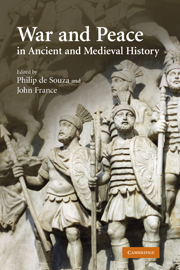Book contents
- Frontmatter
- Contents
- List of contributors
- Acknowledgements
- Note on abbreviations
- 1 Introduction
- 2 Making and breaking treaties in the Greek world
- 3 War, peace and diplomacy in Graeco-Persian relations from the sixth to the fourth century bc
- 4 Treaties, allies and the Roman conquest of Italy
- 5 Parta victoriis pax: Roman emperors as peacemakers
- 6 Treaty-making in Late Antiquity
- 7 Byzantine diplomacy: good faith, trust and co-operation in international relations in Late Antiquity
- 8 Treaties between Byzantium and the Islamic world
- 9 Siege conventions in Western Europe and the Latin East
- 10 Paying the Danegeld: Anglo-Saxon peacemaking with vikings
- 11 Peace among equals: war and treaties in twelfth-century Europe
- Bibliography
- Index
5 - Parta victoriis pax: Roman emperors as peacemakers
Published online by Cambridge University Press: 09 August 2009
- Frontmatter
- Contents
- List of contributors
- Acknowledgements
- Note on abbreviations
- 1 Introduction
- 2 Making and breaking treaties in the Greek world
- 3 War, peace and diplomacy in Graeco-Persian relations from the sixth to the fourth century bc
- 4 Treaties, allies and the Roman conquest of Italy
- 5 Parta victoriis pax: Roman emperors as peacemakers
- 6 Treaty-making in Late Antiquity
- 7 Byzantine diplomacy: good faith, trust and co-operation in international relations in Late Antiquity
- 8 Treaties between Byzantium and the Islamic world
- 9 Siege conventions in Western Europe and the Latin East
- 10 Paying the Danegeld: Anglo-Saxon peacemaking with vikings
- 11 Peace among equals: war and treaties in twelfth-century Europe
- Bibliography
- Index
Summary
One of the most prominent cultural and political features of the ancient world is the extent to which the authority and power of rulers was directly derived from their success in war. Victory showed that they were effective leaders, capable of protecting those who acknowledged their rule, bringing them material benefits in the form of booty, slaves and territory, as well as the less tangible, but nonetheless important, rewards of prestige and status. It was also a key way for rulers to demonstrate that their authority was divinely ordained and approved. As ancient states became larger and more complex, however, the establishment and maintenance of peace emerged as a key consideration alongside success in war. This chapter will discuss the political consensus that developed in the first four centuries of the Roman Empire (c. 31 bc–ad 400) concerning the role of the emperor as a maker of war and an establisher of peace. In particular it will analyse the nature and extent of the approval, criticism and opposition to the activities of individual emperors among the aristocratic elite of the Roman world, on whom the emperors relied heavily for political support.
By the beginning of the first century ad the territory of the Roman Empire (imperium Romanum) extended from Spain and Gaul in the West as far as Armenia and the River Euphrates in the East, where a disputed frontier zone separated it from the Parthian Empire.
- Type
- Chapter
- Information
- War and Peace in Ancient and Medieval History , pp. 76 - 106Publisher: Cambridge University PressPrint publication year: 2008
- 1
- Cited by



